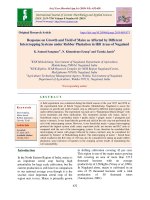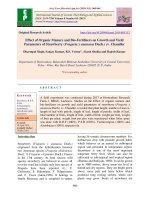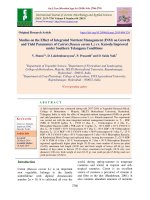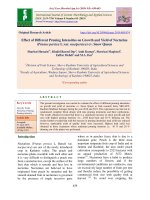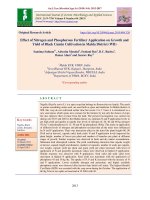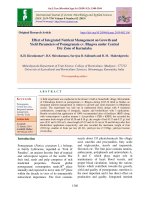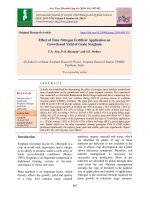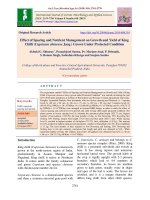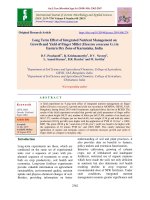Effect of different pruning intensities on growth and yield of nectarine (Prunus persica L.var. nucipersica) cv. Snow Queen
Bạn đang xem bản rút gọn của tài liệu. Xem và tải ngay bản đầy đủ của tài liệu tại đây (188.11 KB, 5 trang )
Int.J.Curr.Microbiol.App.Sci (2019) 8(5): 639-643
International Journal of Current Microbiology and Applied Sciences
ISSN: 2319-7706 Volume 8 Number 05 (2019)
Journal homepage:
Original Research Article
/>
Effect of Different Pruning Intensities on Growth and Yield of Nectarine
(Prunus persica L.var. nucipersica) cv. Snow Queen
Sharbat Hussain1*, Khalid Rasool Dar2, Amit Kumar1, Showkat Maqbool2,
Zaffar Mehdi2 and M.A. Dar2
1
Division of Fruit Science, Sher-e-Kashmir University of Agricultural Sciences and
Technology of Kashmir-190025, India
2
Faculty of Agriculture, Wadura Sopore, Sher-e-Kashmir University of Agricultural Sciences
and Technology of Kashmir-190025, India
*Corresponding author
ABSTRACT
Keywords
Growth, Yield,
Nectarine, Pruning,
Pruning intensity
Article Info
Accepted:
07 April 2019
Available Online:
10 May 2019
The present investigation was carried to evaluate the effect of different pruning intensities
on growth and yield of nectarine cv. Snow Queen at fruit research farm, SKUASTKashmir Shalimar Srinagar during the year 2016 and 2017. The experiment was laid out in
randomized complete block design with nine pruning treatments and three replications.
The results obtained revealed that there is a significant increase in shoot growth and leaf
area with highest pruning intensity viz., 2/3rd head back and 20 % thinning out. The
results further revealed that with the increase in pruning intensities total yield was reduced
however, marketable yield of quality fruits were increased. Highest total yield was
obtained in those treatments where minimum pruning intensity i.e. 10 % and 20 %
thinning out of the plants was performed.
where as in peaches fuzzy skin is due to a
dominant gene. Peach is the third most
important temperate fruit crop of India and in
Jammu and Kashmir, the area under peach
cultivation corresponds to 2523 hectares with
an annual production of 5472 Metric
tonnes[1]. Nectarines have a habit to produce
large numbers of flowers and if the
environmental conditions are conducive, may
set excessively large number of fruits per tree
and thereby reduce the possibility of getting
commercial fruit size with quality fruit at
harvest [4]. To avoid over cropping, the
Introduction
Nectarines (Prunus persica L. Batsch var.
nucipersica) are one of the newly introduced
crop in Kashmir valley. The peach and
nectarine plants resemble with each other and
it is very difficult to distinguish a peach tree
from a nectarine tree, except the surface of the
fruit skin which is smooth and fuzz less in
nectarine. Nectarines are believed to have
originated from peach by mutation and the
smooth skinned fruit in nectarines is governed
by the presence of single recessive gene
639
Int.J.Curr.Microbiol.App.Sci (2019) 8(5): 639-643
number of fruits per tree must be regulated to
promote return bloom [3]. Pruning being an
important horticultural operation not only
restores balance between shoot and root
system but also maintains growth and vigour
of shoots by allowing only fewer growing
points to grow vigorously and regulate the
crop [4]. Performance of nectarine trees
depends heavily on the proper pruning
annually and one of the main purposes of
pruning in nectarines is to produce shoots of
40 to 60 cm in length because these are the
shoots on which flower bud development is
most numerous [4].
uniform plant growth and vigour at a spacing
of 3 X 3 meter in the Research Farm of Fruit
Science at Sher-e-Kashmir University of
Agricultural Sciences & Technology of
Kashmir, Shalimar campus during the year
2016 and 2017. The experiment comprised of
9 treatments each replicated thrice in a
randomized block design. The data were
recorded on different growth, flowering and
yield parameters with standard procedures.
The average length of annual shoot was
measured with measuring tape at the end of
growing season during both the years.
The tree height was measured in centimeter
with the help of graduated flag staff and the
leaf area was estimated with the help of
automatic Leaf Area Meter (221 systronics) in
the laboratory and average values were
expressed in square centimetre (cm2). Fruit
yield was estimated by taking weight of all
the fruits harvested from the tree under each
treatment and expressed as kg/plant. The
pruning were performed during 2nd week of
December with different pruning intensities
viz., T1 (control) - Corrective pruning
Removal of dead diseased and criss cross
branches; T2- T1 + heading back removing
one third of the branch; T3 - T1 + heading
back removing two third of the branch; T4-T1
+ thinning out percent of the one year old
branches; T5- T1 + thinning out 20 per cent of
the one year old branches; T6-T1 + heading
back removing one third of the branch and
thinning out ten percent of the one year old
branches; T7- T1 + heading back removing
one third of the branch and thinning out 20
percent of the one year old branches; T8- T1+
heading back removing two third of the
branch thinning out 10 percent of the one year
old branches; T9- T1 + heading back removing
two third of the branch thinning out 20
percent of the one year old branches. The data
generated from these investigations were
appropriately designed, computed and
tabulated under Randomized complete Block
Nectarine require heavy and regular pruning
because fruiting occurs laterally on last year
shoot which bears only once in its life time
and becomes barren afterwards. Hence, they
require a heavy pruning to strike a balance
between vegetative growth and fruitfulness,
otherwise fruiting area on the shoots gets far
away, which becomes unmanageable. If the
trees are not pruned annually, the volume of
fruiting wood reduces each year [10].
However, pruning also makes the canopy
more open and improves pest control by
allowing better spray penetration into the tree,
air movement throughout the canopy is
increased, which improves drying conditions
and reduces severity of many diseases, while
different pruning intensities are also
performed in nectarine tree to maintain tree
size and shape. Sufficient information is
available on peach pruning in the world,
however, the physiology of pruning is not still
well understood in nectarine. Therefore, the
present study was conducted to evaluate the
influence of pruning on growth and yield in
nectarine, cv Snow Queen.
Materials and Methods
The present experiment was conducted on
five year old nectarine (Prunus persica (L.)
Batsch var. nucipersica) plantation having
640
Int.J.Curr.Microbiol.App.Sci (2019) 8(5): 639-643
Design (RCBD). The data was analysed and
level of significance was tested for different
variables at 5 per cent level of significance.
severely pruned plants. This is due the fact
that the severe pruning reduced the number of
floral buds and fruiting area of wood and
heavy pruning reduced the fruit set due to the
active utilization of carbohydrates, nutrients,
hormones and water content by the newly
grown vegetative shoots, also heading cuts
decreases yield more than thinning cuts and
many small cuts decrease fruiting more than a
few larger cuts as theses cuts reduced the
amount of wood. These results are in
agreement with others authors findings
[6,7,8,9,10]
.
Results and Discussion
The perusal of the data presented in Table 1
reveals that fruit yield was significantly
affected by different pruning intensities. The
highest fruit yield were recorded in treatment
T1 (control) followed by T4 (T1 + 10 % TO)
which were least pruned. However, lowest
fruit yield was obtained under treatment T9
(T1 + (2/3rd HB +20 % TO) which were
Table.1 Effect of different pruning intensities on yield, annual shoot growth, plant height and
leaf area of nectarine cv. snow queen
Treatments
T1 Corrective pruning
T2 T1+ 1/3rd Heading
Back
T3 T1+ 2/3rd Heading
Back
T4 T1+ 10 %
Thinnning out
T5 T1+ 20 %
Thinnning Out
T6 T1 + 1/3rd Heading
Back + 10 %
Thinnning Out
T7 T1 + 1/3rd Heading
Back + 20 %
Thinnning Out
T8 T1 + 2/3rd Heading
Back +10%
Thinnning Out
T9 T1+ 2/3rd Heading
Back + 20%
Thinnning Out
CD (p≤0.05)
Annual shoot
extension growth
(cm)
2016
2017
43.13
42.16
51.14
50.21
Plant height
(cm)
Leaf area
(cm2)
Fruit yield
(kg tree-1)
2016
258.53
250.16
2017
266.37
257.39
2016
33.23
35.28
2017 2016 2017
33.22 18.43 19.78
35.13 15.16 16.48
54.48
55.14
244.47
250.88
37.14
36.51 12.41 13.32
44.31
43.67
259.56
267.85
33.78
33.17 17.21 18.68
45.51
44.69
261.86
270.25
34.18
33.77 16.48 17.61
52.23
51.11
252.20
260.02
35.62
34.68 14.74 15.44
53.18
52.54
253.72
261.37
36.43
35.56 13.66 14.81
55.36
56.47
246.51
253.39
37.54
38.16 12.02 12.62
56.25
57.11
247.21
254.29
38.23
38.45 11.73 12.07
1.36
1.51
1.41
1.62
0.86
0.82
*HB= Heading Back, TO= Thinning Out
641
1.19
1.34
Int.J.Curr.Microbiol.App.Sci (2019) 8(5): 639-643
The data on annual shoot growth; leaf area
and plant height given in Table 1 was
significantly affected by different pruning
intensities. The highest shoot length and leaf
area were observed in treatment T9 (T1 +
(2/3rd HB +20 % TO) and lowest under
control. This is due to the fact that severe
pruning induces the development of longer
and often more numerous shoots and the
average length of new shoots is greater than
the shoots of unpruned trees, which results in
higher amount of photosynthates and nutrients
that enhances cell division and formation of
more tissues resulting into more vegetative
growth.
Acknowledgement
Author(s) are highly thankful to the division
of fruit science SKUAST-K and national
fellowship scholarship for higher studies of
ST students (NFST) by Ministry of Tribal
Affairs Govt. of India for their active
cooperation during the present investigation.
References
Anonymous.
2018.
Statistical
data.
Department of Horticulture, Jammu
and Kashmir.
Bussi, C., Lescourret J, Genard M, Habib R.
2005. Pruning intensity and fruit load
influence vegetative and fruit grow
thin an early maturing peach tree cv.
Alexandra. Fruits, 60(2): 133-142.
Byers, RE., Costa G. and Vizzotto G. 2003.
Flower and fruit thinning of Peach and
other Prunus. Horticultural Reviews,
28:351-392.
Faust, M., Effect of pruning on hormonal
pattern of fruit trees. 1989, pp 296–
301. In: Physiology of Temperate
Zone Fruit Trees: Wiley Interscience.
New York.
Myriam S., Bussi C, Lescourret F, Genard M,
Habib R, Gilreath J. 2005. Pruning
intensity and fruit load influence on
vegetative and fruit growth in
‘Alexandra’ peach. Proc. Fla. State.
Hort. Soc., 118:266-269.
Rathi, DS., Dimri DC, Nautiyal MC, Kumar
A. 2003. Pruning responses to shoot
growth, fruit set and yield in peach.
Indian Journal of Horticulture, 60(2):
151-153
Robinson TL, Andersen RL, Hoying SA.
2006. Performance of six high density
peach training systems in the North
eastern
United
States.
Acta
Horticulturae. 713: 311-320.
Singh Devi, Chauhan J S and Kainth N S.
1997. Pruning in peach: A review.
Pruning also alters the hormonal and
nutritional translocation in the plants, which
promote development of vascular system and
activate nutrient transport, as these results are
in line with the findings others authors[2,5,6,10].
However the highest plant height was
recorded under light pruning treatments viz.,
T1 (control), T4 (T1 + 10 % TO) and T5 (T1 +
20 % TO) compared to sever pruning
treatments.
It is due to the reason that growth of long
shoots is not enough to equal the growth of
the unpruned tree plus the amount of wood
that has been cut away. Thus pruning to a
certain extent effectively control growth and
cause dwarfing effect on pruned plants. These
results are in agreement with others authors
finding [4,6].
From this study, it is concluded that the best
results in terms of vegetative growth were
obtained with 2/3rd HB + 20% TO; but the
fruit yield was lower in this treatment.
However, yield was found highest with
treatment where minimum pruning intensity
i.e. 10 % and 20 % thinning out of the plants
was performed. The increase in pruning
intensity also decreased the time taken for
initial bloom of the plants.
642
Int.J.Curr.Microbiol.App.Sci (2019) 8(5): 639-643
Agriculturae
Reviews
(Karnal),
18(3/4): 147-154.
Singh, D., Chauhan JS. 2002. Studies on
pruning and nitrogen fertilization in
peach. Indian Journal of Agricultural
Research, 36(2): 128-132.
Thakur, N., Rana VS. 2012. Effect of
different pruning intensities on the
growth, flowering, yield and quality of
nectarine.
Indian
Journal
of
Horticulture. 69(1): 117-120.
How to cite this article:
Sharbat Hussain, Khalid Rasool Dar, Amit Kumar, Showkat Maqbool, Zaffar Mehdi and Dar,
M.A. 2019. Effect of Different Pruning Intensities on Growth and Yield of Nectarine (Prunus
persica L.var. nucipersica) cv. Snow Queen. Int.J.Curr.Microbiol.App.Sci. 8(05): 639-643.
doi: />
643
